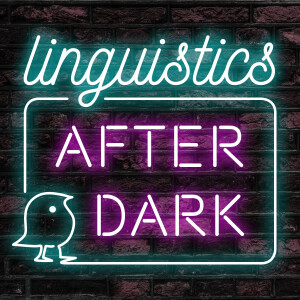

Linguistics After Dark
https://anchor.fm/s/11e456cc/podcast/rssEpisode List

Episode 18: Can't Say "Teeth" Without Teeth
Wherein we are not professionals.Jump right to:4:44 Language Thing of the Day: The short scale vs the long scale21:38 Question 1: Why do we use 'on' to refer to spiders being 'on' ceilings? To me the spiders aren't on top of the ceiling, they're under. All the languages I know use a very similar preposition to 'on' in English, so I'd like to know if any other languages use a different preposition or postposition.38:20 Question 2: Morphologically and grammatically Japanese and te reo Māori behave very similarly: tons of particles all over the place, compounding as a major word source, not many affixes, little to no inflection, reduplication to convey emphasis, and very restrictive phonotactics. I see a pattern: Mandarin, Vietnamese and Thai disallow large consonant clusters and are highly analytic. On the other end of the spectrum there are Georgian (agglutinative hell), and (fusional) Czech, which both have unpronounceable consonant clusters. Is this correlation real or am I imagining things? [If it's real,] what is the reason for this convergent evolution?56:05 Question 3: Would someone wanting to be a linguist need a degree? Or is a degree just a sort of certification? I’ve always wondered this because I’ve always been fascinated by linguistics but I didn’t pursue it in university, instead opting for Translation (which I guess could use linguistics but you know what I mean). Would you guys, actual linguists, consider someone who studies the subject by themselves and engages in conversations of linguistics to be a linguist?1:13:09 Last episode’s puzzler’s answer1:19:09 The puzzler: Complete the sequence. C, F, T, ?, Y, H, N, J, I, ?Covered in this episode:TeethMyriads, millions, milliards, billions, billiards, trillions, and trilliardsDon’t be CanadaIndefinite hyperbolic numerals, like “ten thousand,” “seventy,” “seventy times seven,” “a billion,” “a bajillion,” or “hrair”Hanging on to the roof of a busHorses do not have wallsAre French speakers dans or en a mechsuit? We want to knowThings Sarah gets wrong on DuolingoFrom a spider’s perspective, the enemy’s gate is upDoes anyone do things by purpose?The time on a clock is a place, a month or a year is a container, and a day is a surfaceWhy do English speakers do “strength” to ourselvesThe “s” on a present-tense English verb is spicy and weirdJapanese says you can have little a consonant, as a treatThere are more than seven languages in the worldSyllabic consonantsBeing a linguist is not a real-world careerL’Academie Francais are disqualified from linguistics foreverEli proposes a screenplayIt’s teeth that are the problemLinks and other post-show thoughts:We accidentally skipped drinks chat, but Eli had water and Sarah had a weird but tasty raspberry-lemonade wine cooler thingThe secret dozenal system in English and the long hundredShort scale vs long scale, h/t Bex“Thousand” isn’t actually that weird; it’s just a Germanic word, instead of being derived from Latin. Here’s a map of words for “thousand” in European languages color-coded by etymologyPer Etymonline: “billiards” the game played on as rectangular table with ivory balls and wooden sticks, 1590s, from French billiard, originally the word for the wooden cue stick, a diminutive of Old French bille "stick of wood," from Medieval Latin billia "tree, trunk," which is possibly from Gaulish (compare Irish bile "tree trunk"); totally unrelated to French billiardSee more on our websiteAsk us questions:Send your questions (text or voice memo) to questions@linguisticsafterdark.com, or find us as @lxadpodcast on Twitter, Instagram, and Facebook.Credits:Linguistics After Dark is produced by Emfozzing Enterprises. Audio editing is done by Charlie and Abby, show notes are done by Jenny, and transcriptions are done by Luca and Deren. Our music is "Covert Affair" by Kevin MacLeod.And until next time… if you weren’t consciously aware of your tongue in your mouth, now you are :)

LxAD @ CrossingsCon Announcement
Linguistics After Dark will be live next month! Come see us at CrossingsCon in Philadelphia, August 15th–17th. More details at crossingscon.orgtranscript:ELI: Hey, hey, Sarah, what do you call it when a corvid recites a poem by Coleridge?SARAH: …what?ELI: A crow sings Khan.SARAH: But why? that doesn't make any sens—ohhh, a CrossingsCon, because we're doing a live show there!ELI: Yeah! And, and, hey, Sarah, when are the Ides of August?SARAH: Well, CrossingsCon is the 15th through the 17th. The Ides of August are actually on the 13th.ELI: Wait, no no no, ides are on the 15th, you know, the ides of march, stabby stabby, the whole—SARAH: No, only sometimes, because the Romans did this weird thing where they counted the days in a month—ELI: No no no, this isn't Romans After Dark, this is Linguistics After Dark, come see us live at CrossingsCon, August 15th through 17th, more details at crossingscon.org!

Episode 17: The Vibes Are Iffy
Wherein we learn how to learn how to read.Jump right to:4:53 Linguistics Thing Of The Day: Existential “be” versus straight copula16:32 Topic of the day: Phonics vs. the 3-cueing model, AKA how learning to read works, and how teaching people to read works (or doesn’t)1:37:43 The puzzler: “Second in command managed jewel branch. A boy, last minute, made breakfast spread (6,9)”Covered in this episode:The best holiday dinner foodsExistential verbsCopulasThe science of reading“Vibes-based reading” is probably not a fair term but also maybe not an inaccurate one The phonological processorFLOSZ ruleScribal O“Ghoti” is not pronounced “fish”40% and 90% are different numbersThe difference between being able to read and being able to readStatistically speaking, most people are not SarahThe four-part processing system modelThe orthographic processorDevelopmentally inappropriate fonts for kidsDevelopmentally inappropriate fonts for Sarah on DuolingoEli learns he’s a white girl from OhioSight-reading is not the same as whole-word readingThe semantic processorAssociating dogs and blueberries, dogs and bogs, or dogs and dishesThe context processorMost people will not learn to read on their ownIf you’re good at something, don’t necessarily teach itFor once on this podcast, an actual definitive answer! (Which some people might disagree with.)There is no “too late” in life to learn to readWhere to learn to read, as an adultThe nerdiest part of the episodeThe portion of our audience which comprises sailors from the 1800sLinks and other post-show thoughts:Women, Fire, and Dangerous Things: What Categories Reveal about the Mind, by George LakoffTrue Biz, by Sara NovićWe may not actually have talked about scalar implicature by name on the pod? Sarah talked about it in a linguistics presentation at CrossingsCon, which we think may be what Eli and Sarah were (mis)remembering when they said we’d covered it early on. Potential future Language Thing of the Day…?Sixty-three percent of fourth-grade students performed at or above the NAEP Basic level in 2022, while thirty-seven percent of fourth-grade students performed below the NAEP Basic level. Only thirty-three percent of fourth-grade students performed at or above the NAEP Proficient level on the reading assessment in 2022.Not for the first time and not for the last: chriego and sgrAlso not the for the first time, Canadian syllabicsWhat The Font?The three-cueing system was developed by Ken Goodman, who almost certainly had undiagnosed dyslexia, and has been described as functionally teaching children to be dyslexic, rather than teaching anyone (with or without dyslexia) to actually read.Mapping where words are housed in the brainJumbled words don’t actually work quite like thatThe style of writing Latin that Sarah refers to is called scripto continuaThe four-part processor diagram Kristen describesLETRS course with Louisa Moats and Carol TolmanUFLI is the University of Florida Literacy InstituteThe six syllable types in English orthographyAsk us questions:Send your questions (text or voice memo) to questions@linguisticsafterdark.com, or find us as @lxadpodcast on Twitter, Instagram, and Facebook.Credits:Linguistics After Dark is produced by Emfozzing Enterprises. Audio editing is done by Charlie, show notes are done by Jenny, and transcriptions are done by Luca and Deren. Our music is "Covert Affair" by Kevin MacLeod.And until next time… if you weren’t consciously aware of your tongue in your mouth, now you are :)

Episode 16: SOUTHWYIGHTCKPQRFML
Wherein we guess that’s part of our grammar now.Jump right to:6:16 Linguistics Thing Of The Day: Vowel shifts44:23 Question 1: Why do British people say “I was sat there” instead of “I was sitting there,” are they afraid of gerunds or something?57:11 Question 2: I’ve noticed distinctions between how numbers are pluralised and ordinalized not only between languages, but within them. English has “number mod 100 = 11 or 12 or 13, use ‘th’; number mod 10 = 1, use ‘st’; number mod 10 = 2, use ‘nd’; number mod 10 = 3, use ‘rd’; else, use ‘th’”, but the pluralization rules are just “1” and “not 1”. How do these distinctions evolve?1:10:52 Question 3: What are the features of real languages that made you go “I can’t believe it’s not a conlang!”?1:28:00 The puzzler: When we quizzed a group of musical artists about their favourite Pokemon, the answers were unsurprising: Daniel Merriweather said Charizard, Eiffel 65 chose Blastoise, Coldplay said Pikachu, Spandau Ballet chose Ho-Oh, Echo and the Bunnymen said Lugia, and New Order said Suicune. But what answer did the Kaiser Chiefs give?Covered in this episode:A weird bit of the Massachusetts-Connecticut borderThe guy who founded ChicagoSarah’s Unnamed Cocktail CornerThe unfortunate timing with which printing became widespread in EnglandLong and short vowels, which should be called tense and lax vowels because that’s what people notice anywayEli does not attempt an Australian accentMerch idea: “I Guess That’s Part of My Grammar Now”The Northern Cities Vowel ShiftThe Mississippi River is not a Great LakeSarah is not doing a corpus study of everything she’s ever saidThe Norman Conquest is not when the Great Vowel Shift happenedGerunds and nominalizing or adjectival suffixesSarah out-grammars EliSit vs set and lie vs layHumans are not computersEli over-simplifies Japanese verb conjugationNoun classes sink Eli’s battleshipAnything too systematic in other languages tends to make English speakers go “sounds fake but okay”Prepositions and cases are useful because they free you from each otherThe world’s laziest conlanger invented EnglishLinks and other post-show thoughts:We touched on accents, including what Sarah referred to as “the Chicago /ɑ/,” in episode 2!Other people talking about the Northern Cities vowel shift, including Wikipedia“Mississippi” does in fact mean “big river”! Specifically, it’s the French rendering of an Ojibwe name.The “near-front whatever whatever unrounded vowel” is more formally a “Near-open front unrounded vowel”. The IPA symbol is ⟨æ⟩, or “ash,” which is conveniently pronounced with the same vowel sound it means.The paper Eli mentioned about violence in linguistic example sentences was either Macaulay, Monica, and Brice, Colleen. 1994. Gentlemen prefer blondes: A study of gender bias in example sentences. In Cultural performances: Proceedings of the third Berkeley Women and Language Conference, ed. Bucholtz, Mary, Liang, A. C., Sutton, Laurel A., and Hines, Caitlin, 449–461. Berkeley: Berkeley Women and Language Group, or this one by the same authors. Also here’s a related and interesting paper he found while digging those citations up!English does still have a dual/plural distinction with some words! Examples include both/all, either/any, neither/none, between/among, former/first, and latter/lastHistory of English podcast episode about numbers!First, second, third, -th, vs one-left & two-leftAsk us questions:Send your questions (text or voice memo) to questions@linguisticsafterdark.com, or find us as @lxadpodcast on Twitter, Instagram, and Facebook.Credits:Linguistics After Dark is produced by Emfozzing Enterprises. Audio editing is done by Charlie, show notes are done by Jenny, and transcriptions are done by Luca. Our music is "Covert Affair" by Kevin MacLeod.And until next time… if you weren’t consciously aware of your tongue in your mouth, now you are :)

Episode 15: Mr. White Is On Blast
Wherein we enjoy swearing, big lakes, and ambiguity more than most people.Jump right to:6:25 Linguistics Thing Of The Day: Swearing26:10 After marrying my wife, who is from Chicago, I (who am a native of Boston) often get comments from my in-laws or wife's friends that my accent sounds "British" to them. I think that's ridiculous, but I'm wondering why I consistently get the observation that Bostonians are "British-sounding." Incidentally, I don't think I have a Boston accent at all, but a lot of them say that I do (I don't drop 'r's for example).37:06 In a previous episode, you mentioned Linear B being a syllabary and that Linear A might be. How do we know this? What is cool about this? What fun things should we know?1:01:20 On the topic of syntactic ambiguity I was wondering if there are different languages and grammar systems that are better at mitigating ambiguity compared to English? How do they do it and clarify things as to avoid overlap?1:27:26 The puzzler: What do the English words “uncopyrightable” and “dermatoglyphics” have in commonCovered in this episode:CherriesSwearingNot swearingObjurgation is just a really excellent wordEither everyone has an accent or no one has an accentEngland has too many accentsLake Champlain is not invitedThe only accents are Boston, Chicago, or British?40 actual linguists with swordsConfusing future archaeologistsꙮYou could write English entirely in katakana or romaji, but you shouldn’tSpaces between words are a mirageThe Law of Conservation of Linguistic AmbiguityFrugivorous time flies are much less confusing in speech than textThere is no Platonic realm of languageNatural Language ProcessingFinishing other people’s sentencesPuzzles designed for high class sailors from the 1800sLinks and other post-show thoughts:Lingthusiasm’s Little Longitudinal Language Acquisition Project onesiesSwearing is becoming less tabooSwearing reduces painHow many categories of swear words there are depends on how any given study chooses to group them; three, four mostly, five, or more; in general, the list seems to be religion, sex/sexual acts, bodily functions, animals, family/mothers, death/disease, and slursThe list of functions of swear words that Sarah foundBoston BrahminsThe New England historical accent grid Sarah’s husband has mentioned is real! Eli’s guesses were backwards, however—the north–south distinctions are different vowel mergers, while the east–west distinctions are rhoticity: Northern New England accents have typically had the cot–caught merger, while southern New England accents have tended to have the father–bother merger; eastern New England is historically non-rhotic, while western New England is historically r-fulEli was also wrong about the pin–pen merger; it’s one of the most well-known features of Southern American English, not at all associated with New England. (He may have been thinking of the cot–caught merger, which is most common in the northeastern US?)The Great Lakes vs Europe map overlayThe Eskimo-snow mythMargalit Fox’s book on Linear B, and also her books on sign language, Arthur Conan Doyle, and two British soldiers escaping a POW camp with the help of a Ouija boardMinoan civilization and Mycenaean GreeceMichael and Alice are indeed the correct first names! Linear B was deciphered in 1952 by English architect and self-taught linguist Michael Ventris, based on the research of American classicist Alice KoberThe fiber arts tumblr post Eli quotedMinute CrypticAsk us questions:Send your questions (text or voice memo) to questions@linguisticsafterdark.com, or find us as @lxadpodcast on Twitter, Instagram, and Facebook.Credits:Linguistics After Dark is produced by Emfozzing Enterprises. Audio editing is done by Charlie, show notes are done by Jenny, and transcriptions are done by Luca. Our music is "Covert Affair" by Kevin MacLeod.And until next time… if you weren’t consciously aware of your tongue in your mouth, now you are :)
Create Your Podcast In Minutes
- Full-featured podcast site
- Unlimited storage and bandwidth
- Comprehensive podcast stats
- Distribute to Apple Podcasts, Spotify, and more
- Make money with your podcast












